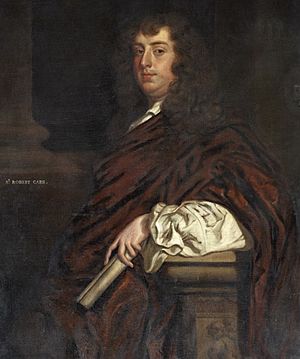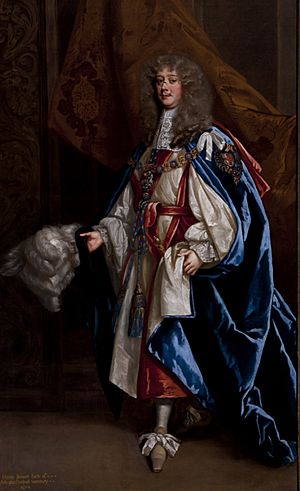Sir Robert Carr, 3rd Baronet facts for kids
Quick facts for kids
Sir Robert Carr, 3rd Baronet
|
|
|---|---|

A portrait of Sir Robert Carr, Bt
|
|
| Chancellor of the Duchy of Lancaster | |
| In office 1672–1682 |
|
| Monarch | Charles II |
| Preceded by | Sir Thomas Ingram |
| Succeeded by | Sir Thomas Chicheley |
| Personal details | |
| Born | c.1637 |
| Died | 14 November 1682 |
| Parents | Sir Robert Carr, 2nd Baronet Mary Gargrave |
Sir Robert Carr, 3rd Baronet (born around 1637 – died November 14, 1682) was an important English politician. He lived during the time when King Charles II ruled England, a period known as the Restoration. Sir Robert Carr held a significant job as the Chancellor of the Duchy of Lancaster, which meant he managed land and money for the King in a specific area.
Contents
Sir Robert Carr's Early Life and Family
Sir Robert Carr was the only son of Sir Robert Carr, 2nd Baronet, and Mary Gargrave. His mother was the daughter of Sir Richard Gargrave. He went to St John's College, Cambridge, a famous university, in 1654. He studied there and earned his master's degree in 1655.
His father was a Royalist, meaning he supported King Charles II when the King was in exile. When the King returned to power in 1660, Sir Robert Carr was seen as a loyal supporter. He was even considered for a special honor called Knights of the Royal Oak. At that time, his family's property was worth a lot of money, about £4,000.
In 1662, Sir Robert Carr married Isabel Falkingham. They had one daughter named Elizabeth. Later, in 1664, he married Elizabeth Bennet. She was the daughter of Sir John Bennet. Through this marriage, Sir Robert gained important connections. His second wife's brother was Sir Henry Bennet, who became a powerful figure in the King's court. These connections helped Sir Robert in his career. He was made a knight before 1665.
Sir Robert Carr's Political Career
In 1665, Sir Robert Carr was chosen to be a Member of Parliament for Lincolnshire. He was against a religious group called the Presbyterians. He kept this important job until he died in 1682. In the same year, he also became a deputy lieutenant for Lincolnshire. This meant he helped manage local affairs and the military.
Sir Robert was very active in the Cavalier Parliament. He was part of many committees, about 391 of them, and gave over one hundred speeches. This shows how involved he was in making laws and discussing important issues.
In 1667, Sir Robert inherited his father's title, baronetcy, and all the family's lands. These lands were worth about £6,000 a year. He had a house in London that was known for lively gatherings.
Sir Robert Carr was against the Earl of Clarendon, a powerful politician. He played a part in Clarendon losing his position in 1667. Sir Robert supported the idea of removing Clarendon from office. He also led an investigation into problems during the Second Anglo-Dutch War. In 1669, he thanked the Duke of Albemarle on behalf of Parliament for his service. From 1670 to 1671, he worked on a committee that looked into uniting England and Scotland.
Sir Robert Carr and the Court Faction

In November 1670, Sir Robert Carr joined a group of politicians who supported the King. This group was known as the Court faction. In 1671, he was given a special role as a gentleman of the privy chamber. This was likely a reward for his strong support of the King's plans.
On February 22, 1672, Sir Robert Carr was appointed Chancellor of the Duchy of Lancaster. He also became a member of the Privy Council of England, a group of advisors to the King. His brother-in-law, Lord Arlington, helped him get this job. Soon after, Sir Robert had to support the Declaration of Indulgence. This was a new law that he had not liked before. He later explained that he preferred those who fought for the King, even if they were Catholics, over others.
In 1674, the French embassy believed that Lord Arlington wanted to use Sir Robert Carr's influence in Parliament. They hoped he could help get support for an alliance between England and France against the Dutch Republic. However, it seems Sir Robert actually had some sympathy for the Dutch at this time. During the 1674 Parliament session, Sir Robert spent a lot of time defending his brother-in-law, Arlington, from being removed from office. He also joined committees to check on the Scottish Army Act and to look into the situation in Ireland.
Sir Robert's support for the King's group meant that some people, like Anthony Ashley Cooper, 1st Earl of Shaftesbury, did not like him. Sir Robert often spoke in favor of giving the King more money. He helped create messages asking the King to stand strong against France. He also promised £200,000 to help build up the navy. He spoke against Parliament trying to limit the King's power by demanding an alliance with the Dutch.
Sir Robert Carr's Later Career
On June 12, 1678, Sir Robert Carr was removed from the Privy Council. This happened after a problem involving the Earl of Lindsey. The Earl was suspected of using soldiers to scare voters in Stamford. Even after this, Sir Robert defended giving jobs to Catholic officers. He also supported allowing James, Duke of York, the King's brother, to keep his seat in the House of Lords.
Sir Robert Carr continued to represent Lincolnshire in Parliament. He was a moderately active member during the Habeas Corpus Parliament and the Exclusion Bill Parliament. In May 1679, he helped explain why a pardon given to Lord Danby should not be valid. He did not speak much about the Exclusion Bill, which aimed to stop the Duke of York from becoming King. However, two months later, he showed disrespect to the Duke of York when the Duke passed through Grantham.
In 1680, Sir Robert Carr was brought back into the Privy Council. But he refused to tell Parliament that the King would not approve the Exclusion Bill. He did not make a big impact during the Oxford Parliament in 1681. Sir Robert Carr passed away on November 14, 1682.

